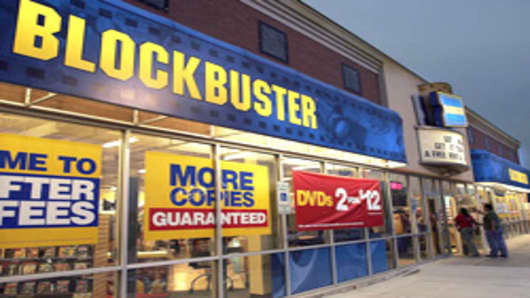Blockbuster failed to update its brick-and-mortar model to compete in the fast-paced digital age, and it's been trounced by Netflix and Redbox.
So after months of struggling with its $900 million debt load and after missing $340 million in debt payments, Blockbuster has finally filed for Chapter 11 bankruptcy. This morning the retailer announced that senior bondholders will cut its debt by 90 percent to about $100 million, exchanging senior debt for equity. Now senior bondholders will provide a $125 million loan to support operations.
What now?
Blockbuster says it'll be business as usual at its 3,000 rental stores, kiosks and digital service. But as the company evaluates operations, we can be sure more store closures are in the works — it recently announced plans to shutter 1,000 locations.
Carl Icahn will take a leadership role, and will be particularly involved in Blockbuster's digital strategy, sources close to the situation tell me. Icahn bought about a third of Blockbuster's bonds earlier this month and has been involved in Blockbuster for years.
Back in 2005 Icahn led a proxy fight to put himself and two nominees on Blockbuster's board. He left the board in January and slashed his stake to just 3.5 percent in March, selling off his stock. Icahn was a major force in the restructuring plan, and sources tell me that he wants to be a major force in capitalizing on the Blockbuster brand to create a real digital offering.
But Blockbuster is facing more competition than ever.
Netflix started gaining on Blockbuster when it was just a DVD-by-mail service. But its digital streaming option has sent the company to the stratosphere — with 15 million subscribers and its stock up 235 percent in the past twelve months.
Netflix is such a force, it's not just a threat to Blockbuster, but also making waves in Hollywood. Just last week Credit Suisse downgraded the *entire* entertainment sector, saying Netflix is stealing control and a real threat to the Pay TV model.
Meanwhile Coinstar's Redbox is also thriving — its DVD rental revenues are on track to top $1 billion this year alone. The dollar-a-day rental business continues to roll out more kiosks and it's planning a move into online streaming, which we'll hear more about this fall.
Not only is Blockbuster trying to go up against Netflix and Redbox in their home territories, it's also facing growing competition from a list of other players — Amazon's Unbox movie service, Apple with its re-vamped Apple TV, not to mention video-on-demand from all the cable and satellite carriers. Even Wal-Mart and Best Buy are offering digital content.
It seems like Blockbuster's main asset now is its brand, and it seems like trying to fight in three areas — brick and mortar stores, online and kiosks is a lot. I predict the company will streamline its business model to hone in on fewer areas. Then we'll see if the Blockbuster brand really is an asset, or if it's actually a liability.
Questions? Comments? MediaMoney@cnbc.com



